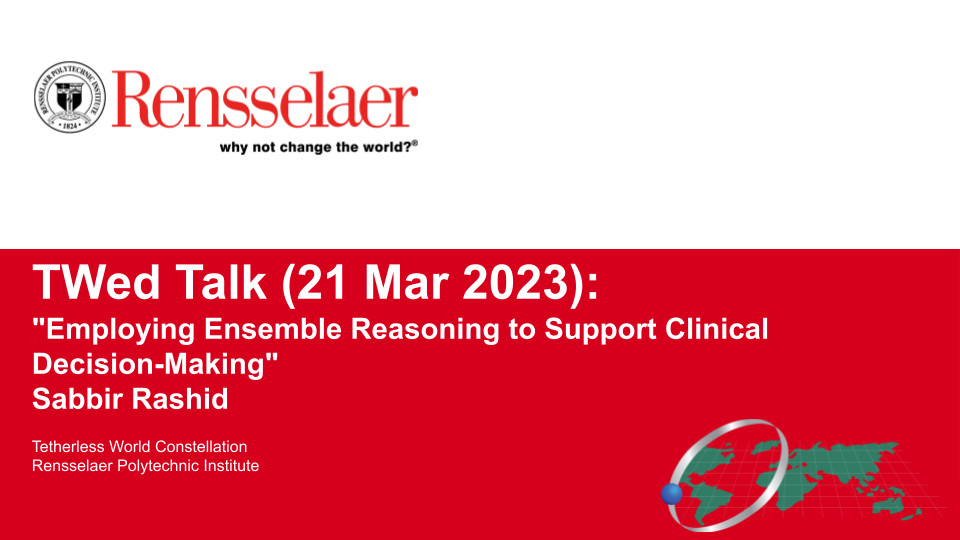
TITLE: "Employing Ensemble Reasoning to Support Clinical Decision-Making"
LEADER: Sabbir Rashid (TWC)
DATE: TUES, 21 Mar, 6p (pizza, salad and pies!! at 5:30p)
LOCATION: Winslow 1140
Webex: https://rensselaer.webex.com/meet/erickj4
TWed VIDEOS: http://bit.ly/twed_twc_rpi
Talk Slides: https://tw.rpi.edu/sites/default/files/2023-03/EmployingEnsembleReasoni…
Please join us next Tuesday (21 Mar, 6p) in Winslow 1140 as TWC PhD student Sabbir Rashid leads us with his thesis defense practice talk!
TITLE: "Employing Ensemble Reasoning to Support Clinical Decision-Making"
DESCRIPTION: The combination of multiple forms of reasoning in conjunction is often used by physicians making clinical decisions. The Select and Test Model, which involves various forms of reasoning including abstraction, deduction, and abduction, is an epistemological framework that represents how reasoning can be employed in a clinical setting. While the subset of Artificial Intelligence (AI) research that is referred to as hybrid reasoning has involved the combination of various forms of reasoning, such as assertional ABox and terminological TBox reasoning, symbolic and statistical reasoning, or static and temporal reasoning, surprisingly little analysis has been conducted on the interaction between deductive and abductive reasoning. Since the term hybrid reasoning has various definitions throughout the literature, we instead refer to the integration of multiple types of reasoning as ensemble reasoning. Several challenges related to ensemble reasoning and their associated research questions naturally arise.
Are the recommendations derived using our approach clinically relevant for use cases involving clinical reasoning? Can the reasoning recommendations be justifiably explained? Is it clinically advantageous to reveal the recommendation rationale? When considering the interaction of multiple types of reasoners, does the order of reasoning make an impact on the results of the reasoning or the time it takes to obtain the results? Does an iterative approach versus an alternating approach make an impact on the results or the time it takes to obtain the results? Why might one approach be preferred over the other? Is it more efficient to split abducibles into subsets, run the abductive reasoner on each subset, and then combine the results than running an abductive reasoner with all abducibles specified? Can all interdependent abducibles be determined?
We attempt to address the questions above and the soundness of our proposed approach by laying a theoretical foundation built on logical proofs. This foundation is then leveraged to design an ensemble reasoning system that we apply to several use cases related to the diagnosis and treatment of type 2 diabetes. We present the recommendations and justifications derived from our system to clinicians in order to evaluate the clinical relevance and usefulness of our approach. By implementing an evidence-based clinical decision-support system that employs ensemble reasoning, we take a step toward advancing the state-of-the-art of AI.
BIO: Sabbir M. Rashid is a Ph.D. candidate at Rensselaer Polytechnic Institute working with Professor Deborah McGuinness on research related to data annotation and harmonization, ontology engineering, knowledge representation, and various forms of reasoning. Prior to attending RPI, Mr. Rashid completed a double major at Worcester Polytechnic Institute, where he received B.S. degrees in both Physics and Electrical & Computer Engineering. His current work includes the integration of multiple forms of reasoning to solve clinicial decision-making problems, such as differential diagnosis, therapy planning, and plan critiquing, in the context of chronic diseases like diabetes. He plans to defend his thesis on April 3rd of this year.
PIZZA, salads AND PIES will be available approx 5:30-5:45p
TWed & IDEA Community Talk Spring 2023 Schedule: <https://tw.rpi.edu/about/twed>
TWed and IDEA Community Talks are informal overview discussions and tutorials on topics of interest to the Tetherless World and IDEA communities. These talks give members and friends of these labs the chance to share tools and expertise. TWed and IDEA Community Talks are not intended to be lectures; we expect them to be highly interactive and fun! Leaders are always encouraged to include live "hack" activities in their session plans.
